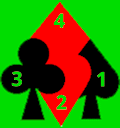Copyright
- Cards
- Three players each receive 18 cards from a 54-card pack including two Jokers. (For two players, see below.)
- Play
-
Hold your cards face down in a pile as for ordinary Snap. At each turn you simultaneously turn the top card of your
pile and slap it face up on the table. As soon as you can, you then call out a prime number that can be made by
combining all three of the numbers displayed on those three cards. For this purpose -
- Each ace counts 1
- numerals 2 to 10 count at face value
- each face card counts 5
- a Joker counts exactly the same as the higher of the other two visible cards.
House rules
- High primes
- Agree whether or not you are allowed primes greater than 97. Not recommended, unless you all know your three-figure primes by heart, or are willing to use a crib.
- Juxtaposition
- Agree whether or not you can juxtapose numerals - by, for example, putting a 7 and an 8 together and calling them 78 (or 87). Not recommended, except for children.
- Face cards
- You may wish to ascribe values
 other than 5 to face cards, such as Jack 11, Queen 12, King 13. The problem
with 5 is that you will often have to make a prime from three face cards, to which the only answer I
can see is 5 (= 5 + 5 - 5, or 5 x (5 ÷ 5,
or even 5^[5 ÷ 5].) Perhaps better is to count face cards at their suit value rather than their
face-less value. For this purpose I favour spades 1, hearts 2, clubs 3, diamonds 4.
other than 5 to face cards, such as Jack 11, Queen 12, King 13. The problem
with 5 is that you will often have to make a prime from three face cards, to which the only answer I
can see is 5 (= 5 + 5 - 5, or 5 x (5 ÷ 5,
or even 5^[5 ÷ 5].) Perhaps better is to count face cards at their suit value rather than their
face-less value. For this purpose I favour spades 1, hearts 2, clubs 3, diamonds 4. - Powers and roots
- Agree whether or not you may use powers and roots. For example, from 2-3-6 you can claim 67 = 26 + 3. (Recommended.)
- Other functions
- Agree any other functions you may wish to recognise. For example, from 5-6-8 are you allowed 97 = 6 + [triangular (5 + 8)]?
- Start
- Deal 18 cards each and 18 face up to the table to form a stockpile. Play as above, with the top card of the stockpile counting as the third card at each turn.
- Continuation
- When all the cards have been won, prepare for the next round as follows. You each contribute your top nine cards to form an 18-card stockpile and continue as before. Keep playing and redealing until one of you cannot contribute nine cards to a new stockpile, or has no card left in hand after doing so. That player loses.
- Footnote
- If you like equation games, see also Brain Drain, Equator, and One Up

